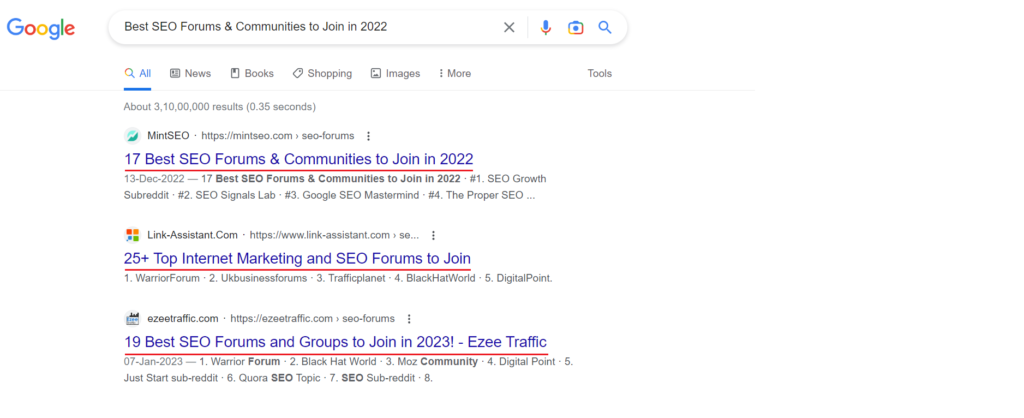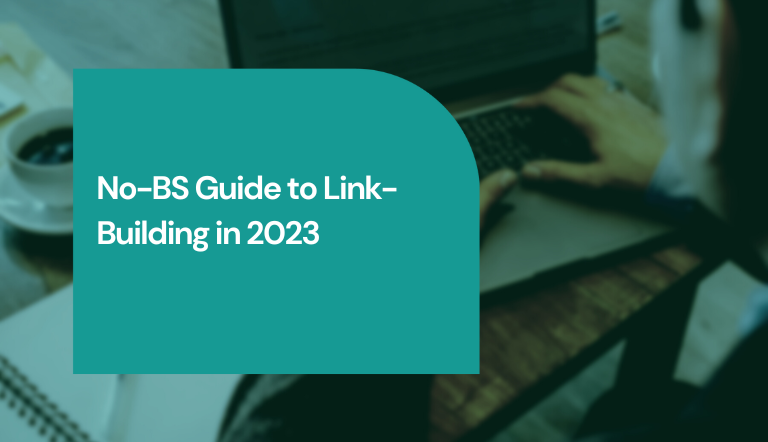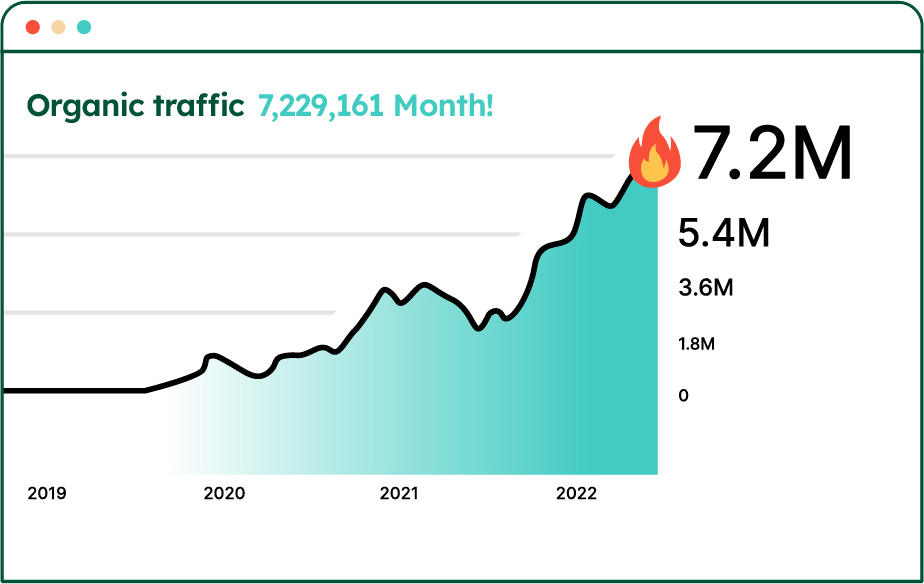While it may be true that you shouldn’t judge a book by its cover, chances are your audience is judging your article by its title.
Say, you are trying to learn more about backlinks. You start by going to Google and looking up “what are backlinks.”
Now, once the results are up, which website, out of the following, are you more likely to click on:
“Backlinks 101 – Everything You need to know about Backlinks”
Or
“Top 10 SEO Tactics Every Marketer Should Know! (Backlinks, Ranking, & More!)”?
Almost all of us will click on the first result. It’s straightforward, relevant, and, compared to the second result, better suited to meet your search intent.
Wondering how you can also write better website titles that lead readers straight to your content?
Then read on to learn everything you need to know about website tiles, including how to create one and how it can help your website’s popularity and search engine rankings.
What is a Website Title?

A website title, also known as the title tag, is the name or headline that appears at the top of your website. It tells readers what your website is about, providing them with some context about the contents of a particular webpage.
Website titles usually only consist of a few words or a short phrase that summarizes the content of your website and appears as a clickable link on a Search Engine Results Page (SERP).
Website titles are useful to users and search engines alike, as they provide information about a website or a webpage, and play an important role in website rankings. Specifically, the website title helps search engines evaluate how relevant your website is for a search using the keywords in your title.
Additionally, if and when someone shares your content or website to a different platform such as Facebook, the website title tag is the first thing readers notice, helping identify and increase traffic to your website.
Thus, you can think of the website title tag as a name tag that readers and different search engines will use to identify and “evaluate” your website. It appears in many places and is one of the most important elements of any website.
Here are some examples of good website titles:
- 9 Actionable Social Media Marketing Tips from Industry Experts – Forbes
- 6 Keyword Optimization Tips for SEO – SEMrush
- 10 Things I Learned From My Failed Startup – Medium
- The Ultimate International Travel Checklist – Worldpackers
- 5 Spices with Healthy Benefits | John Hopkins Medicine
- What’s the Importance of Backlinks (in 2022)? – MintSEO
- Is Marketing a Good Major? [2023 Ultimate Guide] – My Degree Guide
- How To Learn Programming? [Beginners 101 Guide] – Hackr.io
If you look closely, you’ll notice some common elements in these titles that help make them so good. Let us take a further look at what those are, exactly, and how you can use them to create one for your website.
How to Create a Strong Website Title?
When it comes to website titles, there is no one-size-fits-all answer. Different things work for different websites, depending on various factors such as the type of content you publish, the niche, your audience, etc.
That being said, there are some elements that work better than others in helping your website rank higher.
Here’s a list of some of the most common elements that you will find in the best website titles:
#1 K.I.S.S. – Keep It Short & Simple
The more precise and to-the-point your website title, the better.
This is because concise titles are more attention-grabbing and reader-friendly. Not to mention, they communicate the point of the website in a more straightforward way that’s better suited to meet the reader’s search intent.
Another reason why long website titles just don’t work is truncation. If your website title is too long, the search engine will automatically truncate it.
Now, there are some rare cases where this can be used in your favor, such as when you want to create a sense of mystery or intrigue. For example:
- ‘Content Marketing: 13 Ideas That Will Help Your Brand with …’
- ‘The Easiest Vegan Cheesecake Recipe Ever! (Uses Only 3…)’
However, in most cases, it’s better to avoid truncation.
Shorter website titles also work well for SEO, as they are easier to understand, more specific, and more relevant. They also help your clickthrough rate, as users are more likely to click on a clear-cut title.
The search engine will also reward a title that is specific and to the point, as it makes it easier for users to easily identify the contents of the website, and improves the relevance of the search results.
Google doesn’t exactly specify how long your website title should be. But we can use some general estimation to determine what the right length for your title is.
Most browsers on mobile phones and desktops only display up to 70 characters in one line. So it’s a good idea to be mindful of this and keep your website titles around 50 to 60 characters long. You can also use tools such as Portent’s SERP Preview Tool to get a better idea of what your website title might look like on search engines.
Lastly, make sure that your website title is simple and easy to understand. This can be done by coming up with a website title that meets the user’s search intent. Try and identify common keywords or phrases that your target audience is looking for and build your title tag around that.
#2 Don’t Forget The Keywords
There has been some debate in recent years about the importance of keywords in website titles. While traditionally it was said that having keywords in your website title is very important, many people nowadays believe that it’s no longer necessary.
But, as Google points out, website titles still play a huge role in how Google ranks your website. Thus, organically including the relevant keyword in your website title can still make a difference in your rankings.
That said, the keyword should be a natural part of the website title, instead of the title itself.
For example, “Tips to build a resume” almost seems like an incomplete title, whereas,”10+ tips to build a stellar resume in 2023” makes for a more coherent and natural title, while also utilizing the primary keyword, which in this case is “build a resume.”
#3 Numbers Are Your Best Friends
If you’re writing a listicle, then make sure to include numbers in your website title. Studies have shown that users tend to click on titles that have numbers or statistics in them. Some of the examples we mentioned earlier also make use of this very trick.
Having numbers in your website title gives your readers a sense of certainty. It basically tells them that if they click on your website, they will know X more things than they did before. It quantifies the value your website or your article is offering them, thus making it more likely for readers to click on your content.
#4 Include Your Brand Name
Including the name of your brand in your website title can also help your website in many ways.
For starters, it can be a way of putting your or your brand’s name out there. In such situations, the website title is not only a title, but also a branding tool. It shows readers who, exactly, is behind the content they are engaging with and gives them a name they can trust and rely upon.
If, on the other hand, your brand is already well-recognized within your niche, then putting your name in the website title can also be seen as a stamp of approval.
Users who are familiar with your business will likely click on the website title with your brand’s name on it because of their pre-existing trust in your brand. This can help boost your website’s overall CTR (Click-Through Rate).
There is, however, one downside to this – you will have to shorten the actual website title to include the name of your brand, to avoid truncation.
For example, the title ‘The Ultimate Guide to Content Marketing for Absolute Beginners’ is as big as a title can be.
But, when you include the brand name in this title – ‘Super Marketer – The Ultimate Guide to Content Marketing for Absolute Beginners’, you go over the word count and Google will truncate the last few words in the title.
Hence, you need to keep that into consideration when you include brand names in your titles.
#5 Remember Who You Are Writing For
It is easy to get lost in technicalities when you have to think about so many ranking factors. But it is also important to remember that at the end of the day, you are writing for humans, not for robots.
So, while you are trying to write a super-optimized title that makes the algorithm happy, don’t forget to keep the website title meaningful and sensible. You could have the perfect title according to SEO specifications, but if it doesn’t make sense to the common reader, then it’s no good.
Let’s say you are targeting the keyword ‘Best Chocolate Muffins’ for your bakery. Now consider the following website title tags:
- “Get the Best Chocolate Muffins”
- “Delicious Creations – The Best Chocolate Muffins for Your Sweet Cravings!”
Here, both title tags make use of your primary keyword, but the second website title is more inviting and meaningful to the average consumer.
Additionally, you also have to be mindful of who your audience is and keep the title relevant to them. A website title with emojis and modern Gen-Z slang won’t really resonate with someone who’s older. So always ensure that the title of your article or website is relevant not only to the content but also to your target audience.
Why Are Website Titles Important for SEO?
From an SEO standpoint, website titles play a significant role in determining how well a page will rank in SERPs.
Search engines use the website title as a key indicator of what the page is about and consider it when determining the relevance of the page to a particular search query. A well-crafted website title that accurately reflects the content of the page can help boost the page’s ranking in SERPs, driving more traffic to the website.
Moreover, website titles are also important for CTR. When users search for information on search engines, they are presented with a list of results. The website title is often the first thing users see, and it can influence whether they click on a particular result or not. A descriptive and compelling website title can increase the likelihood of a user clicking on a page, leading to increased traffic to the website.
In summary, website titles are important for both SEO and user experience.
They help search engines understand the content of a page, which can lead to higher rankings, and they also provide users with a clear understanding of what a page is about, leading to higher click-through rates. Therefore, it’s essential to create website titles that accurately reflect the content of the page and appeal to users’ interests.





